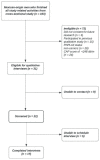Communicating PNPLA3 genetic risk status for NAFLD among Mexican-origin men
- PMID: 36684893
- PMCID: PMC9846364
- DOI: 10.3389/fpubh.2022.1090101
Communicating PNPLA3 genetic risk status for NAFLD among Mexican-origin men
Abstract
Introduction: The burden of non-alcoholic fatty liver disease (NAFLD) continues to disproportionately impact under-resourced communities in the U.S., particularly Mexican-origin populations. Genetic polymorphisms such as the rs738409 C/G variant in patatin-like phospholipase domain-containing 3 (PNPLA3) have been associated with higher prevalence of and progression along the NAFLD spectrum. This qualitative study conducted in the U.S. Southwest aimed to assess Mexican-origin men's experience receiving genetic testing for PNPLA3 risk carrier status.
Methods: Semi-structured interviews were conducted with 17 Mexican-origin men whose NAFLD status and genetic predisposition were determined as part of a previous cross-sectional study. The interview guide included questions exploring participants' insights on how genetic risk status was delivered, how the information influenced their motivation for lifestyle modification to reduce NAFLD risk, and any knowledge sharing that occurred with family members after learning of their PNPLA3 risk status. Interviews were conducted and audio recorded in English (n = 6) and Spanish (n = 11) and uploaded into NVivo software for data analysis and interpretation. Guided by the Health Belief Model, a thematic analysis approach was used to identify primary themes.
Results: Results highlighted men's preference for receiving this type of genetic risk information through a letter sent to their homes. General comprehension of PNPLA3 risk status was deemed high and most men stated sharing their genetic predisposition to NAFLD with their immediate family members. Participants also indicated that family and awareness of this genetic risk acted as primary motivators for implementing behavior changes (e.g., diet, physical activity) toward the prevention of more severe liver conditions.
Discussion: Findings from this qualitative study suggest the feasibility of communicating genetic risk for NAFLD among Mexican-origin men. Future strategies for the dissemination of genetic risk results among Mexican-origin individuals should consider familial and cultural appropriate strategies.
Keywords: Mexican-origin; NAFLD; PNPLA3; genetic risk; men's health.
Copyright © 2023 Villavicencio, Maldonado, Crocker, Guan, Stallman and Garcia.
Conflict of interest statement
The authors declare that the research was conducted in the absence of any commercial or financial relationships that could be construed as a potential conflict of interest.
Figures
Comment on
-
The Expression of PNPLA3 Polymorphism could be the Key for Severe Liver Disease in NAFLD in Hispanic Population.Ann Hepatol. 2017 November-December,;16(6):909-915. doi: 10.5604/01.3001.0010.5282. Ann Hepatol. 2017. PMID: 29055919
Similar articles
-
A Qualitative Analysis of Mexican-Origin Men's Knowledge and Cultural Attitudes Toward Non-Alcoholic Fatty Liver Disease and Interest in Risk Reduction.Am J Mens Health. 2021 Nov-Dec;15(6):15579883211063335. doi: 10.1177/15579883211063335. Am J Mens Health. 2021. PMID: 34872379 Free PMC article.
-
Effects of PNPLA3, TM6SF2 and SAMM50 on the development and severity of non-alcoholic fatty liver disease in children.Pediatr Obes. 2022 Feb;17(2):e12852. doi: 10.1111/ijpo.12852. Epub 2021 Sep 7. Pediatr Obes. 2022. PMID: 34490745
-
IL-6/STAT3 axis dictates the PNPLA3-mediated susceptibility to non-alcoholic fatty liver disease.J Hepatol. 2023 Jan;78(1):45-56. doi: 10.1016/j.jhep.2022.08.022. Epub 2022 Aug 30. J Hepatol. 2023. PMID: 36049612 Free PMC article.
-
Associations of PNPLA3 rs738409 Polymorphism with Plasma Lipid Levels: A Systematic Review and Meta-Analysis.Horm Metab Res. 2022 Oct;54(10):686-695. doi: 10.1055/a-1929-1677. Epub 2022 Oct 7. Horm Metab Res. 2022. PMID: 36206762
-
PNPLA3 I148M and response to treatment for hepatic steatosis: A systematic review.Liver Int. 2023 May;43(5):975-988. doi: 10.1111/liv.15533. Epub 2023 Feb 16. Liver Int. 2023. PMID: 36719059
Cited by
-
Liver magnetic resonance imaging, non-alcoholic fatty liver disease and metabolic syndrome risk in pre-pubertal Mexican boys.Sci Rep. 2024 Oct 30;14(1):26104. doi: 10.1038/s41598-024-77307-8. Sci Rep. 2024. PMID: 39478096 Free PMC article.
-
Emerging role of nanotechnology in treatment of non-alcoholic fatty liver disease (NAFLD).EXCLI J. 2023 Sep 4;22:946-974. doi: 10.17179/excli2023-6420. eCollection 2023. EXCLI J. 2023. PMID: 38023570 Free PMC article. Review.
-
Global Epidemiology and Implications of PNPLA3 I148M Variant in Metabolic Dysfunction-Associated Steatotic Liver Disease: A Systematic Review and Meta-analysis.J Clin Exp Hepatol. 2025 May-Jun;15(3):102495. doi: 10.1016/j.jceh.2024.102495. Epub 2024 Dec 26. J Clin Exp Hepatol. 2025. PMID: 39882540 Review.
References
Publication types
MeSH terms
Substances
Supplementary concepts
Grants and funding
LinkOut - more resources
Full Text Sources
Medical


